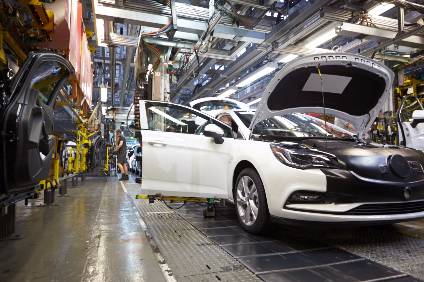The news that the UK’s Vauxhall Ellesmere Port plant is dropping a shift, reducing output and its workforce, gives it a shot at improving its competitive position in the context of the Opel/Vauxhall European manufacturing footprint. The move has been prompted by falling sales of the plant’s single model – the Astra – across Europe. It hasn’t been driven by Brexit trade uncertainties (which are causing rising concern in UK industry, including the automotive sector).
The plant is, though, in a tricky position as a far flung manufacturing outpost that sits outside of the eurozone and, potentially, is subject to higher costs on trade (vehicles and parts) with customers and suppliers in the European Union when the UK leaves the European Union customs union. The Brexit-related depreciation of sterling versus the euro tipped Opel-Vauxhall operations into loss and made GM prepared to sell. Carlos Tavares sees an opportunity to rationalise the combined operations and that rationalisation takes place in a dynamic, rather than static, market environment. Market geography and market segmentation are constantly shifting sands. Tavares wants to maintain or grow group sales, but on a lower cost base.
Will PSA be prepared to make the considerable tooling investment for the next Astra model in one plant or two?
If demand is slower for the Astra due to changing segmentation of the European car market, the case for a fundamental restructuring of Opel/Vauxhall manufacturing may point to the next Astra being made at one plant rather than two. Is that one plant going to be Ellesmere Port or Gliwice, in Poland? The successor Astra will be based on the PSA EMP2 engineering architecture (also used for the 308) and that opens up possibilities for much more flexibility in future production sites. Will PSA be prepared to make the considerable tooling investment for the next Astra model in one plant or two? Or could there be a bigger re-jigging of manufacturing capacities and investment to make the Astra – or certain variants – in French plants (Mulhouse and Sochaux are already lined up for future EMP2 models, but the models have not been announced for ‘strategic reasons’)?
A related question is: What is the best use for a Vauxhall vehicle manufacturing plant in northwest England? If it didn’t make the Astra, what could it make (or assemble)? Post-Brexit trade arrangements between the UK and the EU are a vital factor for a plant that exports much of its output to the EU. As PSA boss Carlos Tavares has pointed out, it is difficult to plan future investments while Brexit uncertainties loom large. But we do know that the Vauxhall brand is a major source of sales for Opel-Vauxhall. And we also know that the UK will be keeping its own currency. A plant in Britain therefore acts as a natural hedge on sterling-euro exchange rate movements. But the plant could get a rethink.
If the UK leaves the EU without a free trade deal and tariffs are introduced on UK-EU trade in cars, a plant in the UK becomes even more important to avoid tariffs on built-up imports. The exchange rate hedging case alone could also point to raising UK manufacturing content. But there is also a more stripped down scenario of assembly-only activity to simply avoid tariffs on fully built-up imports. Multiple models sold as Vauxhalls in the UK market might be put together in Britain from kits shipped from continental plants. It would require fewer workers and would be bad news for workforce skills in Britain as well as the UK manufacturing supply chain, but it might be one scenario that is preferable to outright closure.
The UK content in vehicles manufactured at Ellesmere Port is very low now, so a move to assembly-only could be seen as a natural step to reduce the higher trade cost risks. Much has to be imported from plants in continental Europe currently. Cross border shipments of parts and vehicles are at the root of the problem for PSA as it looks at Ellesmere Port (and some there will recall similar trade/currency worries when Peugeot had its Ryton plant). Raising the level of UK-sourced components content is constrained by the fact that major items – such as engines – will always be sourced from dedicated and high volume plants in Europe that represent huge sums of sunk investment (engines spring to mind). That may well be even more the case under a consolidated pan-European PSA-Opel supply chain. Sourcing more content in the UK would be possible, but making a major impact would be a very long-term project indeed. Carlos Tavares, like other car company bosses, is in a hurry to make a difference as soon as possible. Cutting cost was what he did with PSA to turn it around. Manufacturing plants are expensive items to run; some Opel-Vauxhall plants will inevitably close.
Would customers mind if Vauxhall cars were no longer made in Britain? UK market leader Ford hasn’t been significantly impacted by ceasing car assembly in the UK. If GM had an emotional tie to Vauxhall related to its over 100-year history in Britain, it didn’t count for much in the end. PSA won’t have room for historical sentiment. It will be about the business case and where UK operations fit into a pan-European vehicle manufacturing and supply chain strategy.
Vauxhall’s announcement over Ellesmere Port shows that it is working hard to make the plant as efficient as it can possibly be. If you make one model and that model becomes a slow seller, action is needed. With the parent company in the process of conducting a review of manufacturing operations, the urgency to act is heightened. The good news for Ellesmere Port is that action to improve its competitive position is happening. But the serious questions surrounding future viability remain. And they are not helped by continued Brexit uncertainty.







